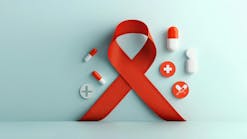In 1996, HIV and its most severe form, AIDS, had been studied in the U.S. for 15 years. AIDS was the leading cause of death for Americans 25 to 44 years old.
In late October of that same year, Chris Podmore took an HIV test at his local health department in Charleston, South Carolina, then waited for an agonizing seven days to get the results. “They gave you a little card with a code and asked you to call them back in a week and punch in your code. If they told you to come back, it was bad news. That’s how you found out back in the day.”
They told him to come back.
Fast-forward to 2019. Podmore has been living with HIV for 23 years. Thanks to antiretroviral therapy, which became the standard of care for people with HIV the year after he was diagnosed, the level of the virus in his body is so low that it can’t be detected. He’s happily married, he’s renovating a house, and he loves his dogs.
He’s also become an advocate for HIV testing. On June 27, National HIV Testing Day, he’s encouraged anyone who’s thinking about getting a test to go ahead and do it. “There’s a reason you’re thinking about getting a test. I think everybody should be tested.”
The sooner it’s caught, the better. And Podmore, who waited for more than 10,000 minutes to get his results, says you can now get yours in 60 seconds.
He would know. He gives HIV tests to patients at MUSC Health, where he works as a program assistant in the Ryan White HIV/AIDS Clinic. The clinic offers free HIV tests year-round.
So much has changed, Podmore says, since his diagnosis. “When I started, there was a waiting list to get medications if you didn’t have insurance. I got in a clinical trial and was lucky that I got the real medicine. It was a ton of pills. On average, the first 15 to 20 years after I tested positive, I think I took about 17 pills a day.”
Not anymore. Advancements in treatments have produced pills that multi-task. “Today, it’s down to two pills a day. Huge improvement.”
Newly diagnosed people may only need one antiretroviral pill a day, he says.
And you don’t have to have insurance to get treatment. Infectious disease specialist Eric Meissner is both a medical doctor at MUSC Health and a researcher who has studied HIV.
“Thanks to the Ryan White program and the South Carolina AIDS Drug Assistance Program, one’s ability to afford health care is not a barrier to HIV treatment,” Meissner says.
“In fact, we have a rapid access program in our clinic where our goal is start patients on medication on their first visit, which could be the day they’re diagnosed if they’re able to be seen in our clinic that day.”
The earlier a person starts treatment, the healthier better, Meissner says. “It makes a big difference. The earlier people get on treatment, the better off their immune system will be with respect to long-term health. The life expectancy for persons living with HIV who are treated is nearly identical to those without HIV these days because the medications are so effective.”
Podmore is a perfect example, and he’s happy to share his story to encourage others to get tested. “The sooner you find out, the sooner you get on medication, the better off you are. The studies out now say if your viral load is not detectable, you can’t transmit the virus.”




